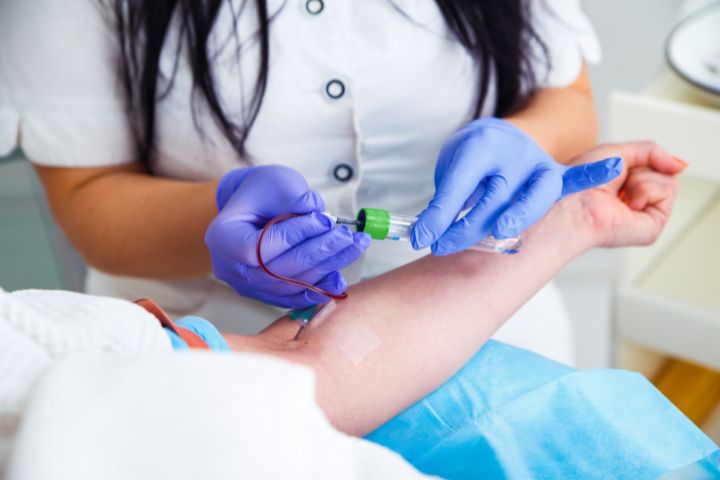Phlebotomy Courses Near Me: Step-by-Step Application Process
Phlebotomy Courses Near Me: Step-by-Step Application Process
Blog Article
The Course to Certification: Understanding the Phlebotomy Training Course Journey and Its Significance
As you take into consideration the path to certification in phlebotomy, it's essential to comprehend the function you'll play in health care. Your training will cover necessary abilities, from blood collection methods to patient interaction. Each element of the program prepares you for the obstacles ahead. What specifically does the trip require, and why is qualification so critical for your future job? Allow's explore these questions further.

The Duty of Phlebotomists in Health Care
Phlebotomists play a necessary role in the medical care system, serving as the important web link in between individuals and important analysis testing. You'll execute blood attracts, guaranteeing examples are collected precisely and safely. Your experience assists in detecting medical problems, keeping an eye on health, and assisting treatment decisions.
In your day-to-day interactions, you'll need to develop trust with individuals, making them feel comfortable throughout what could be a difficult experience. You are accountable for labeling and managing examples thoroughly to avoid contamination or errors, which might influence test results.
Beyond this, you'll usually work alongside physicians and registered nurses, communicating crucial information about patients' conditions. Your duty is fundamental in maintaining the process in health care setups, ensuring timely and precise results. By grasping your abilities, you add meaningfully to person treatment, making you an indispensable part of the medical team. Accepting this duty is vital to your success as a phlebotomist.
Summary of Phlebotomy Training Programs
When exploring phlebotomy training programs, you'll find various kinds made to fit various timetables and discovering styles. Each program helps you develop important skills like blood collection and patient communication. Understanding these options is vital to picking the ideal path for your career.
Kinds Of Educating Programs
Numerous types of training programs are offered for those looking to come to be efficient in phlebotomy. Additionally, some healthcare facilities and facilities provide on-the-job training programs, supplying practical experience while you discover. Whatever course you pick, each program aims to outfit you with the necessary skills for a successful phlebotomy career.

Trick Skills Created
Mastering phlebotomy requires a set of crucial abilities that are established with extensive training programs. You'll find out technical abilities like proper vein selection, needle insertion, and blood collection techniques. These hands-on practices guarantee you can perform treatments securely and effectively. In addition, interaction skills are essential; you'll need to communicate with clients, discuss procedures, and placed them secure. Recognizing makeup and physiology is essential, also, as it aids you find capillaries and understand the body's response to blood attracts. You'll get understanding of safety methods and infection control, guaranteeing you preserve a sterilized setting. Each of these skills is important for your success as a certified phlebotomist, making you a beneficial possession in any medical care setting.
Secret Elements of a Phlebotomy Program
In a phlebotomy course, you'll concentrate on essential subjects that prepared for your future career. You'll involve in hands-on training that permits you to apply what you have actually found out in real-world settings. Both the curriculum and practical experience are crucial for your success as a phlebotomist.
Core Educational Program Summary
While going after a phlebotomy training course, you'll run into a core curriculum created to outfit you with fundamental skills and expertise. Phlebotomy Courses Near Me. This curriculum usually consists of makeup and physiology, focusing on the circulatory system and comprehending blood parts. You'll additionally learn more about different kinds of blood collection approaches, consisting of venipuncture and capillary slit strategies
Additionally, infection control and safety methods are essential parts, ensuring you know how to maintain a sterile atmosphere. You'll study patient interaction, emphasizing interaction and empathy, which are crucial for alleviating person anxiety.
Hands-On Training Experience
Obtaining hands-on experience is a vital part of your phlebotomy training program. This practical training enables you to use what you've found out in a real-world setup, improving your skills and confidence. Phlebotomy Courses Near Me.
Additionally, you'll get the chance to engage with people, which is vital for developing your interaction abilities. This combination of technical effectiveness and interpersonal skills is important for your success as a certified phlebotomist. Eventually, hands-on training is where concept meets method, solidifying your expertise and preparedness for accreditation.
Accreditation and Licensing Needs
Before you can start your occupation in phlebotomy, it is essential to understand the certification and licensing demands that vary by state. Most states need phlebotomists to hold a qualification from an identified organization, such as the National Phlebotomy Association or the American Society for Medical Pathology. These accreditations commonly involve passing a test that tests your understanding and skills in the area.
Along with accreditation, some states have specific licensing demands. You may need to complete a particular variety of hours in professional practice, send evidence of training, or undertake a history check. It is essential to investigate your state's laws to make certain you fulfill all essential requirements.
Staying informed about these requirements not only aids you safeguard a placement however likewise improves your reputation as a professional. By fulfilling these requirements, you'll be well on your Bonuses means to an effective occupation in phlebotomy.
Hands-On Training and Practical Experience
Hands-on training and functional experience are necessary elements of your phlebotomy education, as they allow you to use theoretical knowledge in real-world circumstances. During your training, you'll take part in monitored venipuncture, discover appropriate techniques, and come to be aware of various blood collection equipment. This straight involvement is essential for constructing your self-confidence and developing your abilities.
You'll function closely with seasoned experts who can guide you via the nuances of person interaction and example handling. Each practice not only enhances your understanding but additionally prepares you for the hectic environment of health care settings.
In addition, numerous programs include professional rotations, permitting you to experience diverse setups, from healthcare facilities to outpatient clinics. This direct exposure helps you adjust to various difficulties and person requirements, ensuring you're well-prepared for your future duty. Embrace these possibilities, as they're vital to coming to be a qualified and compassionate phlebotomist.
Difficulties Encountered During Training
While obtaining hands-on experience is important, it's vital to identify the challenges that can develop throughout your phlebotomy training. You might experience anxiousness when performing procedures on genuine people, especially if you're new to the setting. The stress to get whatever right can be overwhelming. In addition, grasping the abilities needed for blood attracts takes method; you may deal with technique initially.
Time monitoring can additionally be a difficulty, as harmonizing concept, sensible sessions, and individual dedications can really feel challenging. You might deal with differing discovering rates amongst your peers, causing sensations of insecurity if you believe you're falling behind. Ultimately, adapting to the different individualities of teachers can be tough, as each might have an one-of-a-kind training design.
Identifying these barriers early on can prepare you for success and aid you establish durability throughout your training journey.
Career Opportunities After Qualification

As you get experience, you could even take into consideration specializing in areas like pediatric or senior citizen phlebotomy, catering to details client demands. Some phlebotomists choose to advance their occupations by becoming lab professionals or pursuing additional education and learning in healthcare areas.
In addition, your certification can result in duties in training or supervising new phlebotomists, enabling you to share your expertise. With the medical care industry constantly expanding, your abilities will certainly always pop over to this site be in demand, paving the way for a secure and satisfying profession. Accept the opportunities awaiting you!
Often Asked Concerns
What Is the Normal Period of a Phlebotomy Training Program?
Phlebotomy training courses usually last around four to 8 weeks. You'll take part in hands-on technique, class go now guideline, and on-line learning. Completing this training prepares you for certification and a gratifying profession in health care.
Are Online Phlebotomy Courses Available?
Yes, on the internet phlebotomy programs are offered. They use versatility and benefit, enabling you to examine at your very own speed. Just verify the program is certified to meet certification needs and obtain beneficial abilities for your occupation.
Exactly How Much Does Phlebotomy Training Usually Expense?
Phlebotomy training normally costs between $700 and $2,500, relying on the program and area. You must think about elements like course length, consisted of products, and hands-on experience when selecting the right training for you.
What Are Usual Prerequisites for Phlebotomy Training?
Typical prerequisites for phlebotomy training usually include a high school diploma or GED, booster shots, and a background check. Some programs may also need basic medical care knowledge or certifications, guaranteeing you're prepared for hands-on training.
Can I Function While Finishing My Phlebotomy Training?
Yes, you can work while finishing your phlebotomy training. Many trainees equilibrium tasks with their researches, but make certain to handle your time effectively to ensure you fulfill both work and training commitments efficiently.
Report this page